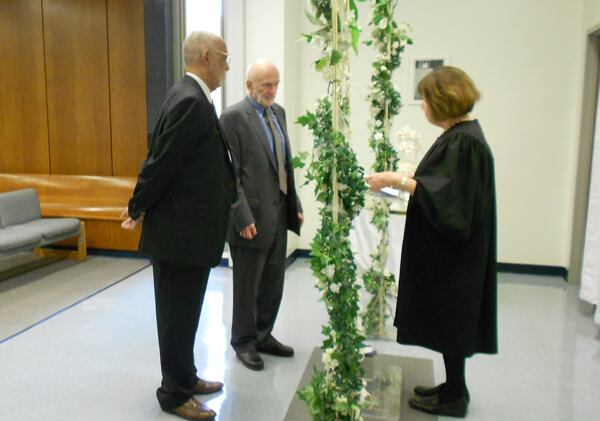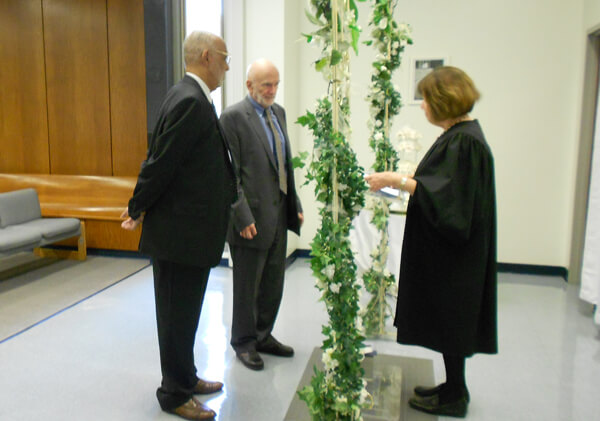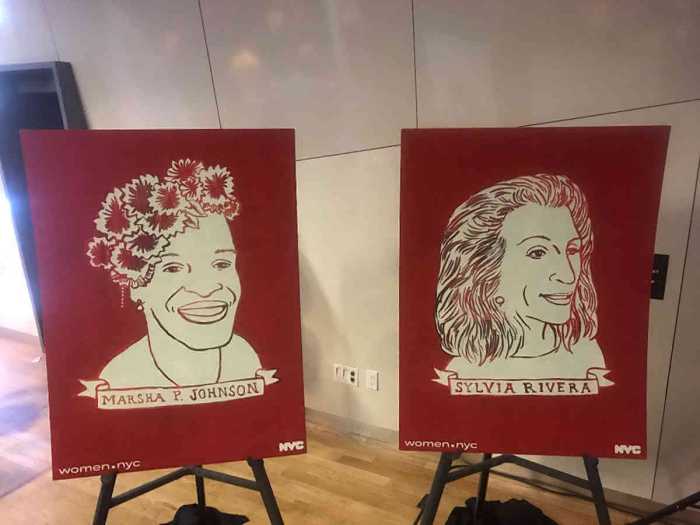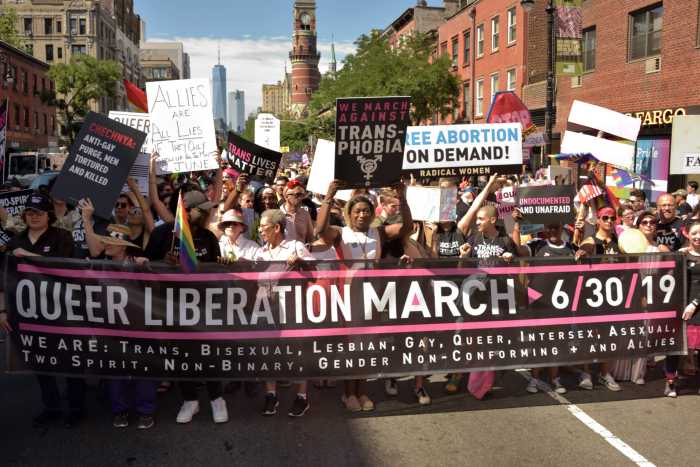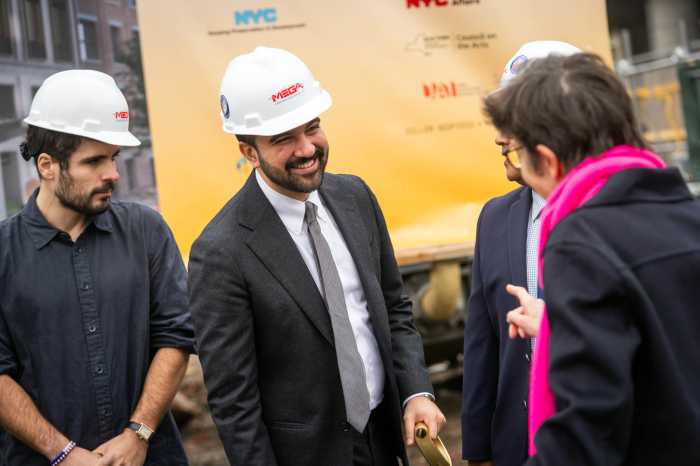David Ehrenstein and Bill Reed married by Judge at Beverly Hills City Hall. | JAI KATO
On February 25 at 11:30 a.m., after 43 years of intimate cohabitation, Bill Reed and I were married at Beverly Hills City Hall. Judge Marjorie Harris, a polished, poised, and delightful woman who has married a number of same-sex couples since Proposition 8 was overturned in 2013, presided.
Since marriage is a contract issued by the state to recognize the joining of two individuals into a single legally-empowered entity, only our desire to do so and an explication of the commitment we’d be making (“in sickness and in health”) were mentioned. The Big Invisible Bi-Polar Daddy Who Lives in the Sky played no part in the proceedings. As those who pay fealty to him (her, it…?) well know — but would rather curl up and die than acknowledge — the marriage ceremonies performed by priests, rabbis, and whatnot are utterly valueless without the legal protocols that must be affixed to them. If not, you can “O Promise Me” till the Disney cows come home. It won’t mean a thing.
Our marriage meant quite lot, as did that of the others married by Judge Harris that morning: an Asian-American male/ female couple (with a large party of some 20 friends and relatives to witness it) and a lesbian couple (a classic butch with short hair and in slacks, her femme bride in a traditional white wedding dress) with their two children, a little boy excitedly taking pictures and a little girl twirling happily in her white bridesmaid’s dress. We came with our friend Jai, who took pictures. All six of us who took vows are now free to revel in the 1,138 benefits, rights, protections, and obligations provided on the basis of marital status in federal law.
More importantly we’ve personally enriched our lives.
Marriage wasn’t on anyone’s minds when gays, lesbians, transsexuals, and transvestites took on the NYPD at Stonewall 46 years ago. Likewise, it didn’t figure in the plans of the gay rights organizations that came in its immediate wake. When I joined the Gay Activists Alliance in New York, our goals were many and varied; getting basic civil rights protection and fighting off the slings and arrows homophobes rained on us every day were two of the most important. But over and above all, we were trying to get fellow LGBTs to come out of the closet.
This wasn’t an easy task. Not just because an un-closeted existence risked breaking with one’s blood family and put one’s employment at rsk but because far too many thought of their sexual orientation as something along the lines of a “bad habit” — like smoking, nail-chewing, or bed-wetting. Obviously it’s not, but breaking that mental dam was no simple task — even in a city as seemingly sophisticated as New York. Now, in what one may well refer to as the Post-Neil Patrick Harris Era, the closet is rapidly becoming a relic of days gone by.
When Bill and I first set up shop together circa 1971, marriage wasn’t at all in the cards for us as a couple, either. Indeed, the notion that we’d be together this long wasn’t really countenanced. Like so many gay man of our generation, our relationship “just happened.” We had no master plan, no “agenda.” We simply enjoyed each other’s company and continued to keep it. As we have never been monogamous, we’ve indulged in the sexual and, to varying degrees, romantic favors of other parties over the course of time.
Yet for all our sexcapades, we’ve never thrown caution to the wind. Once we tried a three-way — which proved awkward and unsatisfactory. But that was about it, really. We’re pretty “vanilla” overall. Consequently, the AIDS epidemic that at its height picked off a considerable number of our friends, while devastating us emotionally, passed us by physically. Having fought for basic rights and respect for more than a decade, AIDS made us fight for our very lives — and because of it, the coupled relationships so many of us had formed seemed more precious than ever.
As with all gay couples, our alliance hasn’t always been easy. We’ve had spats of varying degrees of intensity. More importantly, we’ve faced personal crises, the most challenging of which came in 1997 when I suffered a hypertensive stroke — brought on by undiagnosed high blood pressure — that put me in the hospital for six weeks and left poor Bill in a state of extended anguish. But I recovered, with his invaluable help, and as Sondheim would say, we’re still here. We’re hardly exceptional in that.
There are a great many others who’ve enjoyed long-term coupledom like ours. One thinks of Christopher Isherwood and Don Bachardy or James Bridges and Jack Larson or Gore Vidal and Howard Austen. They were lucky to be living in copasetic climes. Other couples in less welcoming circumstances had to take their chances. Now such hostility is on the wane. In a remarkably short space of time, “gay marriage” has gone from the “unthinkable” to the de rigueur.
Ira Sachs’ marvelous comedy-drama “Love is Strange” acknowledges just what many long-term coupled gay lives are like — with marriage making the once-clandestine public and proper. Thirty-seven states now boast marriage quality: 26 by court decision; eight by state legislative action; and three by popular vote. There has, of course, been pushback — most notoriously, the recent ruling out of the Alabama Supreme Court essentially countermanding a federal district court decision (despite that enjoying the US Supreme Court’s acquiescence) and still holding up its unimpeded implementation.
Still, the resistance is for naught. The nation’s high court takes up the gay marriage question later this month and the outcome does not appear to be in doubt.
And yet the struggle will continue. The right to marry may have been won, but the right to hold a job, have a place to live, or even go shopping remains in peril. Today — in 2015! — only 22 states provide nondiscrimination protections based on sexual orientation, with three of that number (New York among them) not also covering gender identity. No protections exist on the federal level, except for anti-discrimination provisions for federal workers, a tiny fraction of the total work force. So, as heartening as the marriage equality juggernaut has been to witness, a “cart before the horse” aspect to this whole business remains. For its entirely possible to be married to a person of your own sex and lose your job because you are in an area that doesn’t provide job protection.
And now, crying “religious freedom,” the homophobes are fighting back, cobbling together a variety of laws to “protect their right to discriminate” against us. They will, in the long run, lose — and the recent debacle in Indiana hints at the possibility that day may come sooner rather than later. Universal acceptance, as with all civil rights struggles, is another matter. My husband and I well know that the past has much to teach us about the present and future of LGBT life — be it married or single.
Never forget that, until 1973, when gayness was declassified as a “mental illness,” we were “homosexuals,” which is to say mentally unstable men prone to commit “homosexual acts” — or rather the “act,” anal intercourse. It has never ceased to amaze me that the Heterosexual Dictatorship (Isherwood’s ever-useful term) has been obsessed with anal intercourse, as if it were the alpha and omega of gayness, all that “homosexuals” were interested in. Completely overlooking other forms of sexual pleasure and romantic expression we enjoy, this anal intercourse matrix cleverly reduces “homosexuality” to a single physical action, incidentally leaving those who “commit” it free to be categorized as “heterosexual” when not so engaged. The lives that we actually live and the culture we have built, replete with cultural figures as complex and multi-faceted as Marcel Proust, Oscar Wilde, W.H. Auden, Jean Genet, Tennessee Williams, Isherwood, Stephen Sondheim, Larry Kramer, and Patrice Chéreau were either passed over in silence or ritually attacked.
To appreciate the tenor of those times and their cultural conceits, William Goldman’s 1969 book “The Season: A Candid Look at Broadway” can serve as Exhibit 1. Writing of “Everything in the Garden,” a fairly innocuous, minor Albee play about suburban housewives supplementing their incomes through prostitution, Goldman declares, “The play makes three central statements: 1. All wives are whores, 2. All husbands are panderers, 3. The only wisdom lies with bachelors and young boys. In other words, ‘Everything in the Garden’ is as clear a statement of the homosexual mystique as one could hope to find.”
That such a grotesquely paranoid screed was countenanced without complaint may surprise us today, but when Goldman’s book first appeared its unabashed homophobia was taken quite seriously indeed. And its dissing of Albee wasn’t his only occasion for such bile-spewing; with equal gusto, Goldman attacks everything from Judy Garland fans to a failed and now long-forgotten comedy called “The Ninety Day Mistress,” which he claims was really a gay play in straight disguise. At one point, taking his cue from “Homosexual Drama and Its Disguises,” a noxious screed Stanley Kaufman wrote for the New York Times in 1966, Goldman goes so far as to remark “This is a difficult chapter to write because of the necessity of being ‘hinty.’ It is perfectly all right for one to come out and say that Marcel Proust was a homosexual but that is because he is dead. The living homosexuals, the ones who inhabit the world of the arts and, particularly for this discussion, Broadway, are not about to be named.” Then, while claiming to do otherwise, he names Albee, William Inge, and Tennessee Williams.
The same year Goldman’s book appeared, the Stonewall riots changed the face of American culture once and for all. Gays, lesbians, and transgender folks fought back against the police and the Mafia, whose collusion largely kept us socially restricted to commingling in scuzzy dives whose overpriced, watered-down drinks picked our pockets while ravaging our self-esteem. But there was self-esteem aplenty that night in June of ’69, bolstered some say by the fact that Judy Garland was buried that day and, having lost this pivotal icon, those queens were pissed. Many have pooh-poohed the notion that “Judy Grief” played any role, but it should never be forgotten that Garland concerts were one of the rare places gays could congregate and have fun in the same way straights did — openly and without fear of arrest. That was no small thing in those days.
But those days are gone, if not forgotten. Judy concluded her fabled 1961 Carnegie Hall concert not with “Over the Rainbow” but with “Chicago,” whose key lyric in her telling goes, “I got the surprise, the surprise of my life / I had to stop and stare/ I saw a man dancing with his own wife/ And you will never guess where.” And now that man can dance with his own husband. And, not so long ago, we’d never dare have guessed where.

